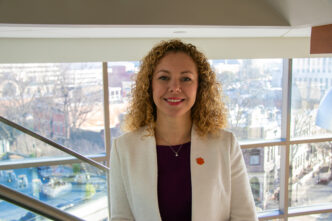Clemson alumna Shubhashrita Basu, Ph.D., economics ’21, an applied microeconomist working in the fields of health and labor economics, presented her work – co-authored with Kevin Thom and Avigyan Sengupta – on geriatric ADHD and economic outcomes at the Frontiers in Economic Analysis with Genetic Data conference at the University of Chicago in March. In her presentation, Basu shared some of the first evidence of the link between ADHD likelihood and later life outcomes in older adults.

Basu, now a postdoctoral research associate with the Center for Demography of Health and Aging, University Wisconsin-Madison, investigates how individuals respond to experiences and exposures through family linkages and other environments that impact their life-course outcomes. She sometimes leverages tools of social science genomics to explore some of these topics, as with the work she presented at the conference.
“Using an experimental module in the Health and Retirement Study with diagnostic questions for ADHD, we develop a statistical model to predict this disorder in study respondents based on readily observable outcomes and survey responses,” explained Basu.
Basu et al. then used the polygenic index of predisposition to ADHD to evaluate whether childhood financial distress (CFD), a composite measure of financial adversity, moderates genetic risk in explaining the predicted likelihood of ADHD in elderly adults. Results show that the polygenic index is positively associated with very high values of their constructed ADHD likelihood. This relationship is particularly large for those growing up with high CFD.
Their findings further indicate that an 11% increase in estimated ADHD likelihood is associated with:
- A 6.7% decrease in probability of working.
- An 11% reduction in earnings among workers.
- An 11% reduction in household wealth.
Basu looks back fondly on her Ph.D. experience at Clemson, which she credits as the foundation of her research. She says that Clemson has been instrumental in helping her to achieve her career goals and applauds her department’s commitment to the success and excellence of its students.
“The Department of Economics at Clemson feels like a family,” recalls Basu. “My advisors were amazing, and I am still in touch with all of my committee members.”







